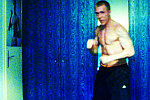 Shadows off the beaten path
Shadows off the beaten pathIMPORT EXPORT | THE WAVE
< < F O R E I G N > >
last update 9.Oct.08
See also: SHADOWS FILM FESTIVAL
 R E V I E W B Y R I C H C L I N E
R E V I E W B Y R I C H C L I N E MUST
MUST  SEE
Gomorra
SEE
Gomorra
scr Maurizio Braucci, Ugo Chiti, Gianni Di Gregorio, Matteo Garrone, Massimo Gaudioso, Roberto Saviano
with Gianfelice Imparato, Salvatore Cantalupo, Toni Servillo, Bernardino Terracciano, Marco Macor, Ciro Petrone, Salvatore Abruzzese, Carmine Paternoster, Maria Nazionale, Gigio Morra, Carlo Del Sorbo, Zhang Ronghua
 release It 16.May.08,
release It 16.May.08, UK 10.Oct.08
08/Italy Fandango 2h17
Grand Prix:
CANNES FILM FEST
TORONTO FILM FEST
 There's not a false moment in this multi-strand mob drama from Italy; every character and situation not only feels strikingly realistic, but also has something provocative to say about the way the world is changing around us.
There's not a false moment in this multi-strand mob drama from Italy; every character and situation not only feels strikingly realistic, but also has something provocative to say about the way the world is changing around us.
There's a rigid system in Naples, where Don Ciro (Imparato) represents the old world, efficiently caring for the families of mobsters in prison. But the rules seem to be changing. Meanwhile, veteran tailor Pasquale (Cantalupo) takes a dangerous approach to his Chinese competitors; Franco (Servillo) finds a protege (Paternoster) who's shaken by the realities of the business; Marco and Ciro (Macor and Petrone) find a stash of guns and think they rule the world; and 13-year-old Toto (Abruzzese) is impatient to take his place in the system.
The title is a play on the notorious Comorra crime family, and director-cowriter Garrone thoroughly grounds his movie in real life, avoiding the excesses of Hollywood mafia movies while drawing on their traditions and stories. It's filmed with bracingly confident camera work, using long takes and clever depth of focus to keep us focussed finely on the characters even as things get increasingly complicated. This gives the film an emotional kick that puts us right into the story.
Every strand of this film is packed with authentic energy, humour, terror, violence and even tenderness. It centres around a grim working class housing estate that's instantly recognisable and confounds our expectations. And the sense of community is shown in hundreds of ways, including some that are seriously frightening, as friendship can turn in a second if the corporate honour is at stake.
Structurally, the film feels meanders through the barely connected scenes, darting between a wide range of characters. But as it progresses, these people become so sharply focussed that we're gripped by their individual journeys, all of which head to surprising conclusions. And the various plots parallel each other intriguingly, all catching the central theme that this structured and clear-cut world is being undermined (or perhaps purged) by a modern society that's obsessed with media images and perhaps even moral correctness. Although you definitely don't want to cross these people.
1.Sep.08
 R E V I E W B Y R I C H C L I N E
R E V I E W B Y R I C H C L I N E Sono Viva
Sono Viva
with Massimo de Santis, Marcello Mozzarella, Giovanna Mezzogiorno, Giorgio Colngeli, Guido Caprino, Vlad Toma

release UK Oct.08 lff
08/Italy 1h27

 Riveting and surprisingly provocative, this slow-burning Italian thriller really puts us into the shoes of its central character. And the solid writing, directing and acting keep us utterly riveted.
Riveting and surprisingly provocative, this slow-burning Italian thriller really puts us into the shoes of its central character. And the solid writing, directing and acting keep us utterly riveted.
Rocco (de Santis) is not having a good day. He's completely out of money, facing foreclosure and, worse yet, disapproval from his girlfriend. Then when he's at the end of his tether, his loose-cannon friend Gianni (Mozzarella) invites him along on an all-night job, where they'll earn an easy profit by watching the daughter of an older gentleman (Colngeli). But she turns out to be dead, Gianni takes off for a party and Rocco is left alone with her. Well, until her brother (Caprino) and her boyfriend (Toma) arrive to freak Rocco out even more.
The film has a blackly comic undertone that beautifully takes the edge off what would otherwise be an unbearably grim story. Constant flashes of humour and small ironic moments fill each scene, even when things get either emotional or tense. And through it all, de Santis delivers an impeccably controlled performance, beautifully underplaying Rocco's reactions and interaction, while everyone around him chews on the scenery just a little.
This approach does exactly what it should do: puts us right into Rocco's position. He's constantly refusing to go along with the cruel or callous behaviour of the other characters, and we admire his respectful attitude and desire to help this troubled family, as well as his inventive approach to the most outrageous situations. We don't even begrudge him his escape to a local pub, where the barmaid (Mezzogiorno) offers him a friendly ear. And some helpful background information on this dysfunctional family.
As the film progresses, the mystery deepens until Rocco is forced into a few unpredictable decisions. And the Gentili brothers' most skilful touch is to create a genuinely palpable relationship between Rocco and this beautiful dead woman. Essentially, this is a story of a long night of the soul for a generally decent man who has forgotten that he is actually of some worth to society. It's a message that couldn't really be more timely, and it's a cracking little film.
8.Oct.08 lff
 R E V I E W B Y R I C H C L I N E
R E V I E W B Y R I C H C L I N E
scr Ulrich Seidl, Veronika Franz
with Ekateryna Rak, Paul Hofmann, Michael Thomas, Maria Hofstätter, Georg Friedrich, Natalja Baranova, Natalia Epureanu, Erich Finsches, Petra Morzé, Dirk Stermann, Susanne Lothar, Thomas Nash

release Aut 9.Nov.07,
US Feb.08 piff,
UK 3.Oct.08
07/Austria 2h15
CANNES FILM FEST
TORONTO FILM FEST
 Almost overpoweringly grim, this expertly assembled film is a strongly focused look at the realities in Europe, east and west. It's sometimes a bit hard to stomach, but has such vividly realistic characters and situations that it can't be ignored.
Almost overpoweringly grim, this expertly assembled film is a strongly focused look at the realities in Europe, east and west. It's sometimes a bit hard to stomach, but has such vividly realistic characters and situations that it can't be ignored.
In industrial Ukraine, Olga (Rak) is a young nurse looking for a better way to support her mother and child. She tries a stint on a webcam sex service before heading for Vienna to work with a friend (Bureanu) as a cleaner. Meanwhile in Vienna, Pauli (Hoffmann) is a young tough guy trying to get work as a security guard to pay a debt he owes to his stepdad Michi (Thomas). But that doesn't go so well, so he ends up travelling with Michi to Ukraine on a vending machine maintenance trip.
This is a film about two people who never meet. Both are searching for meaning in life, willing to make big decisions even as they are unsure who they are or what they want. All they seem to know is that they will have to get out of their homes to find it. Seidl takes a documentary approach to the story, letting the camera hang back and observe the action, which seems to progress with a raw, natural rhythm.
The film is stunningly well-shot by Ed Lachman and Wolfgang Thaler in washed-out images that feel stark and unfriendly (no wonder these people are on the move). And the faces aren't much more welcoming. Many scenes consist of long, slowly tracking shots that simply catch the interaction between people--tiny glances that say everything. This is most notable in Olga's encounters with a nurse (Hofstatter) who feels threatened by her presence.
These kinds of inter-relationships give the cast members plenty to draw on, and Seidl prowls through the layers of behaviour, never flinching away from anything. And most scenes feel slightly unfinished, hanging on the possibilities. Like real life, the experiences of these two searching people often feel random, but first-time actors Rak and Hoffmann capture their earthy humanity in every scene. The result is draining and extremely bleak, but thoroughly haunting.
15.Sep.08
 R E V I E W B Y R I C H C L I N E
R E V I E W B Y R I C H C L I N E Die Welle
Die Welle
scr Dennis Gansel, Peter Thorwarth
with Jürgen Vogel, Max Riemelt, Jennifer Ulrich, Frederick Lau, Christiane Paul, Elyas M'Barek, Cristina do Rego, Maximilian Mauff, Amelie Kiefer, Jacob Matschenz, Maximilian Vollmar, Ferdinand Schmidt-Modrow
 release Ger 13.Mar.08,
release Ger 13.Mar.08, UK 19.Sep.08
08/Germany Constantin 1h41
SUNDANCE FILM FEST

 A searing central theme lends this slightly heavy-handed film a strong sense of urgency. It examines a real-life school experiment to recreate a fascist dictatorship, which is far too successful for anyone's good.
A searing central theme lends this slightly heavy-handed film a strong sense of urgency. It examines a real-life school experiment to recreate a fascist dictatorship, which is far too successful for anyone's good.
Rainer (Vogel) is a rock-n-roll teacher who's annoyed that he has to teach a week-long seminar on autocracy (he'd much rather teach anarchy). He needs to wake up his students, so he gets them to form a closed society, excluding anyone who doesn't follow their rules, with the primary goal of unity through conformity. But things quickly spiral out of control as the class adopts a name (The Wave), logo, uniform and salute. And one student (Lau) is taking it all far too seriously.
The film works both as a gripping dramatic thriller and as a swirling collection of big ideas. Characters are dealing with drugs and alcohol, pregnancy, work satisfaction, teen angst and relational troubles. And in the middle is the fact that there's nothing left in modern society to rebel against. Or is there? As the students start to get into their autocracy studies, they grump about looking yet again into the whole German thing (the Nazis, the Stasi), but they start to come to life when someone mentions George W Bush.
As the classroom begins to form into a well-ordered machine, the story starts to get deeply unsettling. The filmmakers sharply construct each scene so we can watch how easy it is for people to fall into such an attractive trap, especially when they're searching for a solution to problems in the society around them. And the cast cleverly plays the characters as realistic people who are seduced by immediate results that are overwhelmingly positive.
Yes, the moral is a bit obvious, and it floods into the film in an overdramatic way that's thoroughly terrifying. But the screenwriters cleverly look at the theme from an organic perspective, offering various options and dead-ends, letting characters snap out of it (and get drawn in deeper), and building to the logical "we can change history" climax. Best of all is the way it shows Rainer's personal journey, powerfully played by Vogel as a man who inadvertently unleashes something he can't control.
23.Jul.08


See also: SHADOWS FILM FESTIVAL
© 2008 by Rich Cline, Shadows
on the Wall